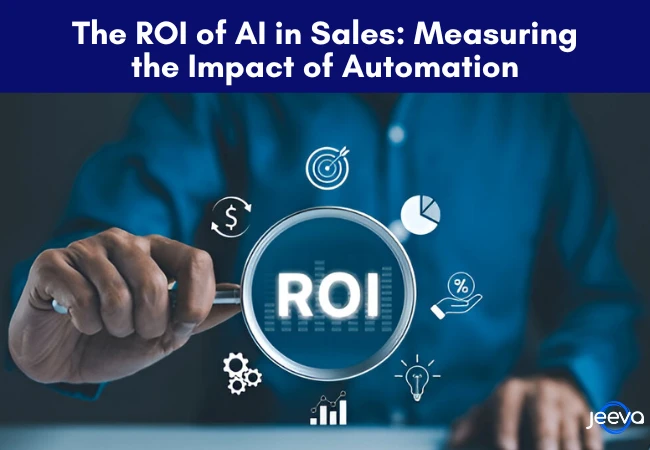As businesses strive for efficiency, AI-powered sales automation is quickly becoming a key differentiator. But beyond the hype, how can businesses actually measure the ROI (Return on Investment) of AI in sales?
According to Google Cloud, 74% of organizations are currently seeing ROI from their gen AI investments.
In this blog, we will explore the tangible impact of AI-driven automation on sales processes and how companies can effectively track and quantify its benefits.
How AI Impacts Sales and Tracks its Benefit
1. Increased Sales Efficiency
One of the most immediate benefits of AI in sales is its ability to streamline repetitive tasks. By automating routine activities such as lead qualification, data entry, and follow-up emails, AI frees up sales teams to focus on high-value tasks like nurturing relationships and closing deals.
Measuring Efficiency Gains:
Time Saved: Track the amount of time sales reps spend on manual tasks before and after implementing AI. The reduction in time spent on administrative tasks directly correlates to more time spent on selling.
Sales Productivity: Compare the number of deals closed or calls made before and after AI implementation to measure increased sales productivity.
2. Improved Lead Generation and Qualification
AI-powered tools can analyze large amounts of data to identify high-potential leads more effectively than traditional methods. By leveraging predictive analytics, AI can also prioritize leads based on their likelihood to convert, ensuring that sales teams focus on prospects with the highest value.
Measuring Lead Quality:
Lead Conversion Rates: Track the percentage of leads converted into customers before and after the use of AI tools. Improved conversion rates indicate more effective lead qualification.
Lead Scoring Accuracy: Measure how accurately AI is able to score leads compared to traditional methods. This will help gauge its impact on targeting the right prospects.
3. Personalized Customer Engagement
AI enables highly personalized customer interactions at scale. By analyzing customer behavior, preferences, and past interactions, AI can help sales teams tailor their messages and approach to each prospect, increasing the chances of conversion.
Measuring Engagement Impact:
Customer Interaction Metrics: Monitor the number of interactions per lead or customer, as well as the quality of those interactions. Personalized outreach often leads to better customer engagement.
Customer Satisfaction and Retention: Track customer satisfaction scores and retention rates to measure how AI’s personalized approach impacts long-term relationships.
4. Faster Sales Cycles
AI-driven automation not only accelerates lead qualification but can also streamline the entire sales cycle. From initial contact to closing the deal, AI helps remove bottlenecks, reduce delays, and ensure that the process moves smoothly.
Measuring Sales Cycle Time:
Cycle Duration: Track the average time it takes to move a lead through the sales funnel before and after AI implementation. A reduction in sales cycle duration indicates greater efficiency and speed.
Time to Close Deals: AI can help speed up the closing process by providing sales teams with real-time insights and recommendations, which can be measured against previous cycles.
5. Cost Savings and Scalability
AI in sales is not just about increasing revenue; it's also about reducing costs. By automating tasks and improving efficiency, businesses can reduce the need for manual labor and optimize resource allocation. Additionally, AI tools can scale more easily than human teams, making it a cost-effective solution for growing businesses.
Measuring Cost Savings:
Operational Costs: Track the reduction in costs associated with manual tasks, including hiring and training additional staff. AI’s ability to handle routine work translates into lower operational costs.
Revenue per Sales Rep: With AI handling the heavy lifting, sales reps can focus on high-value activities. Measure how revenue per rep increases after AI implementation.
6. Better Decision Making with Data Insights
AI tools can analyze vast amounts of data in real time, providing actionable insights that empower sales teams to make better decisions. From identifying trends in customer behavior to forecasting sales performance, AI helps businesses understand the factors driving success.
Measuring Data Impact:
Sales Forecast Accuracy: Evaluate the accuracy of sales forecasts before and after using AI tools. AI’s predictive capabilities often result in more accurate and reliable forecasts.
Decision-Making Speed: Track how quickly your sales team is able to respond to market shifts and customer demands, thanks to the data insights provided by AI.
7. Quantifying the ROI of AI in Sales
To quantify the ROI, businesses must look at the specific outcomes of AI implementation and compare them to the costs involved. Some key metrics to track include:
Revenue Growth: Track revenue before and after the adoption of AI tools to measure its impact on top-line growth.
Cost Efficiency: Compare the costs of AI tools against the savings from improved efficiency and reduced manual labor.
Customer Acquisition Costs (CAC): AI can help reduce CAC by improving lead qualification and closing rates. Track how this metric changes with AI adoption.
Return on Investment: Calculate ROI by comparing the benefits (increased sales, reduced costs) against the initial and ongoing costs of implementing AI in your sales process.
Summing Up
AI in sales is no longer a futuristic concept—it’s a powerful tool that can transform how businesses approach sales. By measuring key metrics like productivity, lead conversion, and sales cycle duration, businesses can determine the real impact of AI on their bottom line. As AI tools continue to evolve, the ROI of sales automation will only increase, making it a crucial investment for companies looking to stay competitive in the digital age.
Connect with Jeeva AI
Jeeva AI
2708 Wilshire Blvd,
Santa Monica, CA 90403, United States
Phone number: +1 424-645-7525
Email address: g@jeeva.ai
AI in Sales
Sales Automation





